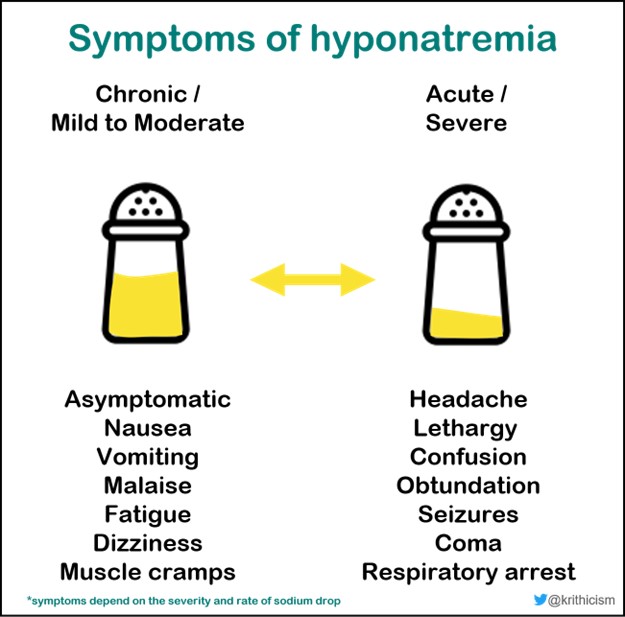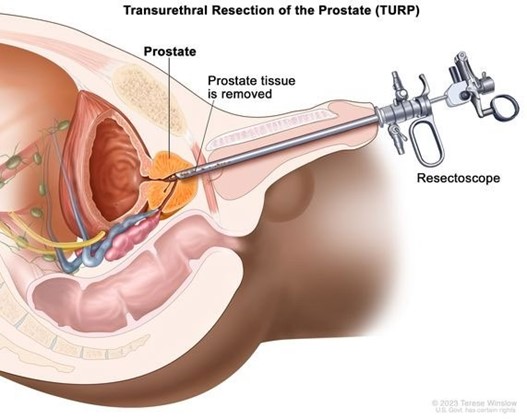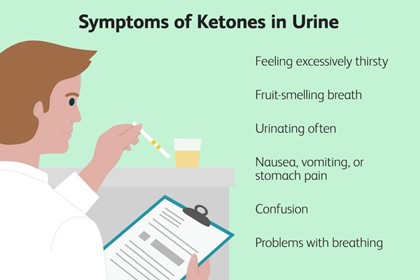A nurse is collecting data from a client who has hyponatremia. Which of the following findings should the nurse expect?
Muscle cramps
Constipation
Hypertension
Blurred vision
The Correct Answer is A
Hyponatremia refers to a lower-than-normal level of sodium in the blood. Sodium is an essential electrolyte involved in various bodily functions, including maintaining fluid balance and transmitting nerve impulses. When sodium levels are low, it can lead to fluid imbalances, affecting the function of muscles and nerves. Muscle cramps are a common manifestation of hyponatremia and occur due to alterations in muscle excitability and contractility.
Constipation: Constipation is not typically associated with hyponatremia. It can occur due to various reasons, such as dietary factors, lack of physical activity, or other medical conditions, but it is not a direct consequence of low sodium levels.
Hypertension: Hyponatremia is not usually associated with hypertension (high blood pressure). Hypertension can be caused by several factors, including genetics, lifestyle, and certain medical conditions, but it is not directly related to low sodium levels.
Blurred vision: While blurred vision can occur in some medical conditions, such as diabetes or certain eye disorders, it is not a typical finding in hyponatremia. Visual disturbances are not a direct consequence of low sodium levels.

Nursing Test Bank
Naxlex Comprehensive Predictor Exams
Related Questions
Correct Answer is ["A","B","C"]
Explanation
The correct answers are a. Document urine color, b. Monitor the client for reports of bladder spasms, and
c. Check the drainage tubing for obstructions.
a. Documenting urine color is important to monitor for any changes that may indicate complications or issues with the bladder irrigation. It helps identify any bleeding or clot formation.
b. Monitoring the client for reports of bladder spasms is crucial as bladder spasms can indicate irritation or obstruction in the urinary system. Prompt intervention can be provided to alleviate discomfort and prevent complications.
c. Checking the drainage tubing for obstructions is essential to ensure proper flow of the bladder irrigation solution. Obstructions in the tubing can lead to inadequate irrigation, which can affect the effectiveness of the procedure and potentially lead to complications.
d. Maintaining the client in a left side-lying position is not specifically indicated for continuous bladder irrigation after a transurethral resection of the prostate. The client's position should be based on their comfort and overall condition, and there is no specific requirement for a left side-lying position in this context.
e. Using clean technique for intermitent irrigation is not appropriate for continuous bladder irrigation. Continuous bladder irrigation requires aseptic technique to reduce the risk of infection and contamination.
By performing these actions, the nurse ensures proper monitoring, documentation, and maintenance of the bladder irrigation system, promoting the client's safety and well-being.

Correct Answer is C
Explanation
c. Ketones positive.
Explanation:
Ketones in the urine can be an indication of diabetic ketoacidosis (DKA) or other metabolic disorders. It is abnormal and should be reported to the healthcare provider for further evaluation and management. Positive ketones suggest that the body is breaking down fats for energy instead of using glucose, which can be a sign of inadequate insulin levels or utilization.
Options a, b, and d are within normal ranges or do not indicate an immediate concern. A specific gravity of 1.020 is within the normal range and indicates appropriate urine concentration. Uric acid levels of 475 mg/24 hr are not mentioned as abnormal or concerning in the context provided. Nitrites negative indicates the absence of nitrites in the urine, which is a normal finding and indicates the absence of a urinary tract infection.
However, it's important to note that clinical judgment should always be exercised, and the nurse should consider the patient's overall clinical presentation and history when interpreting laboratory results and making decisions regarding reporting to the provider.

Whether you are a student looking to ace your exams or a practicing nurse seeking to enhance your expertise , our nursing education contents will empower you with the confidence and competence to make a difference in the lives of patients and become a respected leader in the healthcare field.
Visit Naxlex, invest in your future and unlock endless possibilities with our unparalleled nursing education contents today
Report Wrong Answer on the Current Question
Do you disagree with the answer? If yes, what is your expected answer? Explain.
Kindly be descriptive with the issue you are facing.
